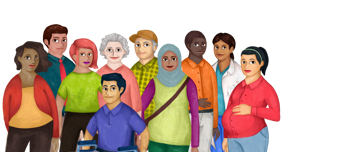
The precision medicine effort begins accepting applications from international organizations to use the Researcher Workbench to accelerate discoveries
The National Institutes of Health’s All of Us Research Program is now taking applications from international academic, not-for-profit, and health care organizations to access data through its Researcher Workbench. The program began testing its secure, cloud-based data platform three years ago with researchers from U.S.-based academic, not-for-profit, and health care institutions. As originally planned, All of Us has updated its eligibility criteria for data access to engage more researchers and enable additional insights into health and disease.
“Our participants have generously donated their health data to All of Us to accelerate health research and medical breakthroughs that benefit us all,” said Josh Denny, M.D., M.S., chief executive officer of the All of Us Research Program. “We have an obligation to maximize the use and utility of their data to achieve that goal, while continuing to fiercely protect their privacy and data security. We want to enable the best and brightest researchers across the world to make discoveries and explore a broader range of hypotheses that will be relevant to all people.”
The All of Us Research Program is a historic effort to partner with at least 1 million people across the United States to build one of the most diverse biomedical data resources of its kind, which researchers can use to gain insights into the biological, environmental, and behavioral factors that influence health. By design, All of Us supports broad data access, a core value of the program, to help advance research that ultimately will further our understanding of health, improve health equity, and lead to more tailored approaches of disease prevention and treatment.
The Researcher Workbench is an important resource in the biomedical and behavioral research ecosystem. Extending the use of this investment to additional researchers will open new avenues to design more focused prevention strategies, assess current medical treatments, and discover new drug targets.
“The Researcher Workbench is built to support a pipeline of continuous discoveries that will build on each other over time,” said Karriem Watson, D.H.Sc., M.S., M.P.H., chief engagement officer of the All of Us Research Program. “The platform will catalyze new collaborations and empower researchers with a diversity of experiences and backgrounds, including those from low- and middle-income countries, to seek solutions to some of the most persistent health challenges affecting our communities.”
All of Us has established and tested multiple safeguards to protect participants’ information and ensure responsible use of the data by all researchers. Participants’ data remain in the Researcher Workbench platform for analysis. Prior to being made available for research, data are stripped of direct identifiers, such as names and addresses. Access to the Researcher Workbench is then available only to registered researchers affiliated with an organization with a Data Use and Registration Agreement (DURA), a legal and binding agreement that outlines organizational responsibilities, as well as permitted and prohibited uses of the data.
The All of Us Data and Research Center (DRC), coordinated through Vanderbilt University Medical Center, reviews DURA applications and contracts with organizations. For international organizations now eligible to apply for use, the DRC legal team evaluates each application based on a review of applicable laws and regulations.
After a DURA is in place, researchers affiliated with the organization who seek data access must register by verifying their identity, signing a Data User Code of Conduct (DUCC), and completing required All of Us training on conducting research ethically and responsibly. To begin using the data, registered researchers must establish a workspace on the platform with a publicly available description of their project. Each workspace can be audited by the Resource Access Board, the body that oversees compliance with the DUCC. These audits are random, but can also be initiated by members of the public through the Research Projects Directory. The program also carries out continuous ongoing security monitoring and testing to evaluate the system’s protections.
Opening access to All of Us data beyond the U.S. required work to balance the program’s vision for broad data access with its commitment to protect participants’ information. The program developed plans with input from participant communities, subject matter experts, and others. This feedback is reflected in our approach and will continue to be integrated into our future plans for engagement with the international research community to maintain strong diversity among those from different cultures, countries, and areas of expertise who use the All of Us data.
All of Us continues ongoing engagement efforts with Tribal Nations to get input on program activities, and will hold its next Tribal consultation this fall. Data from participants who identify as American Indian and Alaska Native (AI/AN) are not currently in the Researcher Workbench. The upcoming consultation with Tribal leaders will guide the ways in which researchers may be able to access these data in the future.
Accepting DURA applications from international academic, not-for-profit, and health care institutions is the first step towards extending data access to international researchers. The DURA process can take several months for institutions to complete. After that, researchers affiliated with these institutions will be eligible to register and begin their research using All of Us data to help maximize the impact of this scientific resource.
